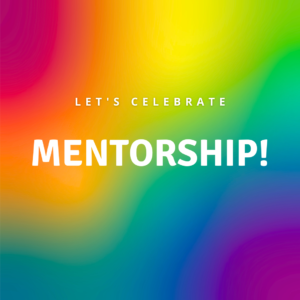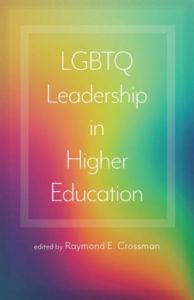Mentoring for Mutual Benefit
In my twenty-five year career as an administrator in higher education, I have been both the organizer and the beneficiary of mentoring. I have been, and continue to be, a mentor to others.
During my graduate school career, there were a couple of professors who were more to me than teachers in the classroom. They were models of how to be a faculty member, how to be a teacher, and how to be queer in the academy.
Toni McNaron was one of the first out lesbian professors at the University of Minnesota. A Milton scholar, she was also one of the founders of the Women’s Studies department at Minnesota. In 1997, she published Poisoned Ivy: Lesbian and Gay Academics Confronting Homophobia. Toni would probably not think of herself as a mentor to me, but what else is it when the chair of your dissertation committee sits across the table from you, nodding and smiling as you haltingly answer questions from scholars more interested in tearing you down than building you up? I will never forget her calm supportive presence or the key advice she gave me when I was trying to decide on a job offer, “Go where you are wanted.”

The faculty member, Lisa Albrecht, would definitely recognize me as a protegee. She hired me for my first teaching position, actively mentored me during my first year of teaching, and invited me to work with her outside of class on a gay and lesbian literary journal. She was the model of a collaborative, engaged academic, winning one of the University of Minnesota’s first awards for community service. Years after grad school, Lisa and I had lunch and talked about her goals for the remainder of her career. Mentoring benefits both parties.
Once I became an administrator in higher education, I heard mentoring talked about in more consistent but somewhat unorganized ways. In my second position as a dean, I was not the only one, there was already another gay dean. (I referred to him, of course, as The Other Gay Dean.) My vice president always matched her new hires with a more established administrator and she suggested TOGD for me. I assumed it was because we were both gay, but I didn’t want to be pigeon-holed, to be expected to take up Gay Issues on campus. (The way Toni and Lisa had had to.) So I asked for a different mentor, one who knew some of my particular job duties. I wasn’t disappointed in his mentorship at all, and I ended up seeing both him and TOGD as friends as well as colleagues.
In my most recent college leadership position, I was a dean of faculty. Mentoring was a constant discussion because we were always talking about setting up a collegewide program for new faculty. Some of the departments had long-standing mentoring programs for their new faculty, but a collegewide program was often mentioned as a way for newcomers to find their way into a large institution. It was there that I learned about alternatives to the old idea of mentoring. You know, the young protegee sitting at the feet of the (usually male) older sage. Understanding the complexity of teaching or leading in colleges or universities, it is clear that one mentor could not serve all the needs of new colleagues. Formal mentoring programs have many different models now–networked mentoring, peer mentoring, group mentoring, etc. New hires are employees, scholars, leaders, teachers, administrators, and humans. They need access to mentors within and without their departments and disciplines, even outside their home institutions.
I have had significant mentoring experiences outside the walls of my institution. In fact, they have been in this organization. Some were short-term, what you might call just-in-time relationships at the Leadership Institute. But one was more lasting. I first met former Executive Director Terry Allison when he was a dean at Cal State LA. He encouraged me to attend my first Leadership Institute in 2015. I was looking for a new job at the time and elected to have a mentor look at my application materials. Later, still looking for a new job, I heard the same advice: expand your search. You’ll do well if you don’t restrict yourself only to California. But I don’t want to live anywhere else, I said. Terry rolled his eyes. He is a California boy himself, but found career fulfillment (and a husband) in other states. Eventually, I did apply for jobs elsewhere, deciding to try New York where my long-distance partner lived. Reader, I got the second job I applied for. (And, yes, I married him.)
Terry is also one of the authors of the chapter on mentoring in LGBTQ Leadership in Higher Education, a book edited by Raymond Crossman and published in 2022 by the Johns Hopkins University Press. In his contribution on queering mentorship, Terry points out that “the mentor-mentee relationship is one of mutual benefit.”

When that job ended, I reached out to Terry, who was planning the 2022 Leadership Institute in Pasadena. I asked if he would cover my lodging if I helped out. He agreed. Shortly thereafter, Terry had to step away from the organization, and I was asked to serve as interim executive director. When Terry decided to retire (for the third time), I was asked to take over on a continuing basis.
So there are a few highlights of my experience with mentoring.
If you are planning to attend the 2023 Leadership Institute in New Haven, you will have the opportunity to request a mentoring session on the registration form. We are also working to develop a mentoring program in 2024 that will be year round and not tied to attendance at the Institute. Stay tuned for more information.
